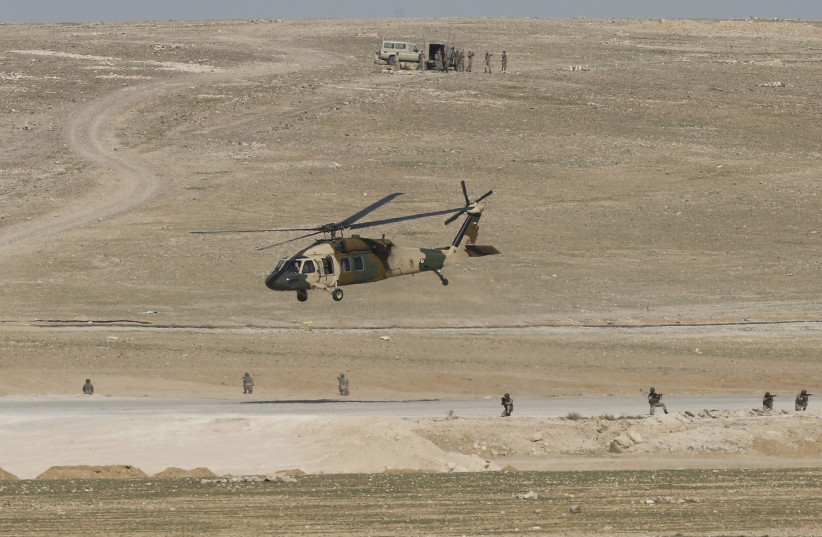US President Joe Biden told reporters on Tuesday that he had reached a decision over the US's course of action in response to the drone strike that killed three US service members and injured about 40 others in Jordan over the weekend.
However, he declined to elaborate on what that response would be.
The drone attack targeted a US military base known as Tower 22 in northeastern Jordan near the border with Syria. It is the first time that American troops have been killed by a strike in the region since the Israel-Hamas war began on Oct. 7.
Islamic Resistance in Iraq, an umbrella organization of various Iran-backed militias in the country, claimed responsibility for the attack and vowed in a statement to "continue its attacks on the strongholds of the enemies in support of the Gaza Strip and in response to the Israeli massacres against the strip for 114 days.”
Tobias Borck, a senior research fellow at the Royal United Services Institute, told The Media Line that an American response is to be expected.

He said the response might involve air or missile strikes and that it would be "a fairly extensive attack," larger than any in recent months when the US has only occasionally responded to the many attacks on US forces in Iraq and Syria.
The basic premise "is that the US will try to find a balance between showing strength and doing whatever it can to re-establish the degree of deterrence and not do something that leads to a wider regional conflagration," he said.
Response will not be a one-off attack
Karl Kaltenthaler, director of the Center for Intelligence and Security Studies at the University of Akron in Ohio, told The Media Line that the administration has said that the response will not be a one-off attack but will be a series of kinetic responses to the killing of US service personnel.
"It is most likely that the US military will be tasked with striking both Iranian proxy targets in Iraq and Syria as well as Iranian IRGC forces in those countries that are viewed as enabling and advocating attacks on US forces. It is unlikely that US forces will attack targets in Iran itself," Kaltenthaler said.
He said that Biden’s primary objective for US forces in the region is to keep them safe, which means deterring attacks on them from Iranian proxies.
"This is done through US strikes that are meant to signal resolve and indicate that there is a cost to attacking US forces. So far, the Iranian proxies have not indicated that the cost is high enough for them to stop their attacks," he said.
Thomas Gratowski, a geopolitics expert who heads Global Counsel’s MENA office in Doha, told The Media Line that the Biden Administration will need to retaliate but will avoid steps to further escalate the situation.
Since Oct. 7, "Biden has worked hard to avoid a regional escalation. The US has retaliated against acts by Iranian proxies but in a proportionate way," he said.
Iran denied involvement in the attack
Gratowski said that Iran has largely done the same and has distanced itself from the Jordan attacks.
Iranian Foreign Ministry spokesperson Nasser Kanaani denied Iranian involvement in the attack.
"Regional resistance factions do not receive orders from Iran, and Iran does not interfere in the decisions of the resistance to support Palestine or defend itself," Kanaani said at a press briefing on Monday.
Borck said that the US is now involved in direct military confrontations with several groups aligned with Iran, but he stressed that he doubted whether retaliation for the strike in Jordan would be the act that pushes everything over the edge into a wider regional war.
"I think the basic premise that neither the United States nor Iran wants to go to war with one another remains in place," he said.
For Biden, the conflict comes at a sensitive time, with presidential elections to be held this November.
In an election year, "he has a fine balance to strike," Borck said. "On the one hand, it [the US] cannot appear weak, he has to show strength. On the other hand, he also, I think, cannot start another big war in the Middle East."
Borck highlighted the level of complexity of the situation for the US.
"From the beginning, from the 7th of October onwards, the US has tried whatever it can to try to contain the conflict from spreading regionally," he said. However, "it has responded to events in the Red Sea. I think we'll see it respond here."
Prominent evangelical leader Dr. Mike Evans has urged former President Donald Trump, now running as a candidate for the Republican nomination for the upcoming elections, to rally the Republican Party in advocating for military action to target Iran's Kharg Island, which he described as a crucial site that accounts for around 90% of Iran's crude oil exports.
Gratowski said that this was not a new proposal, as Republican Senator Lindsey Graham "demanded such a step after the October 7th attacks."
As the island hosts Iran’s main oil export platform and Iran’s economy is dependent on oil exports, it is of critical importance to the Iranian regime, Gratowski said.
Republicans "want to show they’re strong in foreign policy, especially in this election year, to exploit and further cement Biden’s image of weakness since the departure from Afghanistan," he said. "I don’t think Trump would bomb the island if he was president."
Gratowski also said it was very unlikely that Biden would attack Kharg Island, as doing so would knock out more than a million barrels per day in global oil exports, which would send prices high and trigger another Iranian response, possibly affecting oil infrastructure elsewhere in the Persian Gulf.
In this election year, "Biden wants to keep pump prices low, not push them up in an adventurous act in the Middle East," he said.
